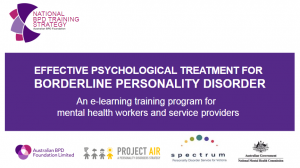Training workshops
Mental Health Community Coalition ACT Inc. offers training events in the ACT about motivational interviewing, mental health first aid, understanding and responding to trauma, and responding to suicide.
Australian Association of Social Workers has registration to workshops in Canberra. These courses are targeted for therapists, health care workers and group trainers. Keep an eye on the events calendar for courses including: intensive DBT, mindfulness, trauma-informed care, art therapy, etc.
Blue Knot Foundation is a policy and practice leader in both clinical and trauma-informed responses to complex trauma. Blue Knot Foundation provides professional development training (both in-house and public), supervision, consultancy and other services to practitioners, organisations and diverse personnel across sectors who work with adult survivors of childhood trauma. Visit calendar event to find out training workshops related to working with trauma-informed care happening near you. Or organise in-house training at your workplace.
University of Sydney offers one-day course open to everyone interested in understanding BPD. It is intended for people who know little about BPD and is designed to introduce people to BPD using DSM-5 criteria.
Living Works offers training workshops for all interested in increasing suicide safety in everyday care situations or formal helping roles.
Visit the Mental Health Community Coalition ACT Inc. for upcoming courses on responding to suicide.
OzHelp Foundation provides suicide prevention training programs for professionals and community members.
Lifeline Canberra offers training in communication, suicide awareness and intervention, mental health awareness and resilience.
Schema Therapy training Australia runs workshops for clinicians in Australian cities including Canberra specifically around BPD and it’s treatment.
Orygen calendar holds a range of training workshops for working with youth mental health. The face to face workshops are held in Australian cities. You can also register for upcoming webinars or access past webinars. Online training modules are available for both clinicians and families and carers.
TATRA is a training provider of practice-based professional development courses, workshops and continuous education programs in Australian major cities. The workshops cover a range of topics on adapting DBT to help clients, supporting family members of people with personality disorder traits, therapeutic relationships, responding to self-harm, etc. In-house training can also be organised for large groups.
Safe in Oz provides training to service providers to allow them to better understand the concept of self-destructive behaviour and working with individuals who display this behaviour. Check out the training calendar for the next workshop near you.
SAFE at Work? is committed to the promotion of improved mental health practices and emotional well-being in the workplace and offers training workshops for employees, supervisors, managers and employers.
Visit the Mental Health Community Coalition ACT Inc. for upcoming courses in Canberra offered by the Mental Health Coordinating Council about trauma and responding to suicide.
Guidelines for working with people with BPD
Download the NHMRC Clinical Practice Guideline for the Management of Borderline Personality Disorder (2012).
Download the National Perinatal Mental Health Guideline (2017) for the assessment, treatment and management of pregnant women/new mothers with BPD in primary care settings.
See Project Air Strategy to download evidence-based guidelines assisting services and practitioners in treating people experiencing a personality disorder and working with their families, partners and carers. Guidelines also available to support teachers and educational staff in working effectively with young people presenting with BPD symptoms.
See the National Institute of Health Care and Excellence (2015) guideline to recognition and management of BPD in primary care, general principles working with people with BPD, assessment and management by community mental health services, and organisation and planning of services.
American Psychiatric Association has online paid courses for professional development in the treatment of people with BPD.
Therapeutic approaches
Australian Psychological Society Events Calendar If you are interested in professional development about various therapeutic approaches to the treatment of BPD, check this site see training workshops you can complete online or attend in Australia.
Schema Therapy training Australia runs workshops for clinicians in Australian cities including Canberra specifically around BPD and it’s treatment.
The Australian DBT Institute in partnership with the Centre for Mental Health Education delivers DBT workshops for mental health clinicians that range from one day to 12 months in duration. These workshops are held in Sydney, Melbourne, Brisbane and Perth. DBT retreats are held in Far North Queensland, Bali and Thailand. Register here.
Behavioral Tech – A Linehan Institute Training Company offers online training and videos around DBT and suicide interventions.
Mentalisation-Based Treatment Training The people listed here are recognised by the Anna Freud Centre as having completed all the requirements to be MBT supervisors and associate trainers. Together they have formed MBT Australia which is the focus for further developments in Australia. Their joint knowledge about mentalizing and its application to clinical work is extensive, ranging from mothers and infants, families, and adolescents to adults and personality disorder.
Spectrum is a personality disorder service in Victoria that offers 1-2 day workshop for clinicians interested in working with people with personality disorders and learning a range of therapy types such as DBT, MBT and ACT.
Practice Ground is a site that provides access to new and past courses, collaborative projects and tools to help improve mental health outcomes. Resources are evidence-based and aimed to help service providers to treat the whole person more effectively as well as supporting workers’ wellbeing.
Therapeutic relationship
Blue Knot offers professional development training about working with complex trauma clients in Australian cities and online. Access the calendar to register for the next training event. Find free fact sheets and videos about providing trauma-informed care on the resources page.
Private Mental Health Consumer Carer Network (Australia) offers practical guide for working with carers of people with a mental illness. This package includes a guide, carer nomination form and online training module.
Communicating with loved ones of those with BPD
Interested in becoming a Family Connections Leader in your local area? Click here for more information on the 2-day training workshop conducted by NEA.BPDAust on 26-27 May 2018.
Kids Matter provides free professional learning which caters for a variety of people working in early childhood services and takes into account educators’ different levels of qualification and experience, as well as varying group composition and size. They can be a starting point for those beginning to think about children’s mental health but also many opportunities for teams wanting to reflect more deeply about their practices, policies and assumptions.
University of Warwick
Babies in Mind: Why the Parent’s Mind Matters
This free online course is aimed at everyone who has an interest in promoting the well being of their own baby, or the parents and babies they work with. You do not need any prior knowledge of infant or child development, just a desire to learn about parents and babies, and the way that early interaction shapes later development. The course is based on the latest research in the field and you will be introduced to key concepts relating to infant psychology and attachment.
Children of Parents with Mental Illness offers free professionally-endorsed online courses targeted to all mental health, family, child and youth services:
- Child aware practice
- Keeping families and children in mind
- Supporting infants and toddlers
- Let’s talk about children
- Family focus
- Child aware supervision
The Private Mental Health Consumer Carer Network (Australia) developed online training modules Consumers and Carers as Educators to inform and support mental health professionals in collaborating with consumers and their carers in their recovery.
E-learning (online) portals
MHPOD is a free effective learning resource primarily designed for nurses, social workers, occupational therapists, psychiatrists and psychologists working in mental health in Australia. It is expected that other people, including general practitioners, consumer workers, carer workers, Aboriginal health workers, and other allied health workers will also find it useful. The content of MHPOD is linked to the National Practice Standards for the Mental Health Workforce. There are over 100 hours of material across 68 topics, written and produced in Australia. The topics include recovery, building a therapeutic relationship, dual diagnoses, parents with mental illness, people who self-harm, working with BPD, etc. You will need to register for an account and log in to take a course. These courses are eligible for Continuing Professional Development (CPD).
Project Air Strategy for Personality Disorders is pleased to provide online training resources for health practitioners including conversations with experts, consumers and special topics.
Mental Health’s Professional Network(MHPN) provides free access for everyone to it’s webinar library covering a range of mental health topics from BPD and supporting people living with BPD to drug use, eating disorders, collaborative care, workplace, trauma, family, etc. Each webinar hosts an interdisciplinary discussion panel and provides resources of readings and slides to invite the audience to raise questions at the end of session. To register to participate in an upcoming live webinar click here.
The MHPN , in partnership with the Australian BPD Foundation and Spectrum Personality Disorder Service for Victoria is producing a free webinar series to increase clinicians’ expertise and ability to provide high quality, responsive, evidence-based treatment, care and support for people with BPD. Click on here to view the first of the six-part webinar series.
Register at the Centre of Perinatal Excellence for access to a free, accredited online training program for health professionals to support guideline implementation for health professionals across primary, maternity and postnatal healthcare settings.
The National Education Alliance for BPD (NEA-BPD) offers 6 module online free course for professional to earn basic principles for the diagnosis and treatment of BPD. Each module available for free features videos of patients, families and experts, interactive quizzes and narrated slides. The complete series can be ordered from www.bpdvideo.com.
Headspace Clinical Toolkit provides information needed to recognise and treat BPD and other mental health issues in young people. It is organised into different tools, each one containing information around one main topic.
Behavioral Health Education Center of Nebraska provides online training modules and recorded webinar sessions targeted towards mental health professionals.
Mental Health Coordinating Council provides Capacit-e mental health e-learning program for organisations, mental health workers, people with experience of mental illness, friends, families, colleagues and anyone with an interest in mental health with information on understanding and supporting mental health recovery.
Black Dog Institute offers online learning modules developed by the Centre for Mental Health Research at the Australian National University on confidently using e-mental health resources (e-MHPrac) in the mental health clinical practice and primary care settings. e-MHPrac resources are free or low-cost and may supplement services for the client.
Mental Health Community Coalition ACT Inc. offers e-learning courses to promote best practice and professional standards, and improve understanding of mental health recovery.
Australian National University e-Mental Health training offers free recorded webinars and short videos series for clinicians to confidently use e-mental health resources in their practice.
E-learning training program for mental health workers and service providers
This training program is endorsed and produced by Australian BPD Foundation Limited, Project Air Strategy, Spectrum and Australian Government National Mental Health Commission.
Module 1 – What is effective care for BPD?
Module 2 – How to effectively engage people with BPD in treatment
Module 3 – How to reduce crises and increase safety to promote recovery in people with BPD
Module 4 – Working actively with people with BPD and connecting with carers, partners & family
Module 5 – Successful BPD treatment: A survival guide for healthcare workers
Literature
Borderline Personality Disorder and Emotion Dysregulation articles is an open journal platform for researchers and clinicians focusing on psychological, social and neurobiological aspects of emotion dysregulation as well as epidemiology, phenomenology, pathophysiology, treatment, neurobiology, genetics, and animal models of BPD. In addition, the journal includes research into co-occurring psychiatric disorders like PTSD, ADHD, depression, eating disorders, conduct disorders, drug abuse, and social phobia, if related to BPD.
Training and resources for GPs and mental health professionals
Professional development
Dialectical Behavioural Therapy Supervision Group and Online Consultation Team
The Australian DBT Institute offers group supervision for clinicians interested in working with clients with BPD. The role of the consultation team is to assist in the therapeutic process by providing feedback and support to therapists. The monthly meetings provide advice, share ideas and discuss ways to cope with difficult clients.
How to Treat Quiz: Borderline Personality Disorder
Online quiz following reading, one hour’s duration. This article is written by Prof Jayashri Kulkarni from Monash Alfred Psychiatry Research Centre.
E-Mental Health in Practice Modules
The Black Dog Institute offers a suite of online training modules, webinars and resources designed to introduce GPs to online programs and tools, and to demonstrate how these tools and technologies can be integrated into face-to-face care as a free or low-cost supplementary resource to their services. There is also a webinar about online self-care for doctors.
E-mental Health – A guide for GPs
The RACGP has developed e-Mental health: A guide for GPs to assist doctors in using e-mental health interventions with their patients when it is safe to do so. The Guide is designed to provide an introduction to the field of e-mental health, direct doctors to key online resources for them and their patients, and help them to decide how to use e-mental health in their practice.
Practice Ground offers Q&A sessions, webinars, courses and resources collected and shared in one web page. The resources are designed for clinicians interested in developing DBT skills or using DBT strategies to work with clients with BPD.
Resources for GPs
Managing borderline personality disorder and substance use – An integrated approach
This article provides an overview of how the GP can provide effective support for patients with co-occurring borderline personality disorder and substance use disorder, including approaches to assessment and treatment, the therapeutic relationship, referral pathways and managing risk and chronic suicidality.
Borderline Personality Disorder – A resource booklet for GPs
This booklet is a short guide for GPs working with patients diagnosed with BPD. It covers the role of the doctor in the care plan, managing crises and suicidality, being aware of consequences of hospitalisation and medication, and taking care of yourself.
Mental health risk assessment – A guide for GPs
This article summarises the risk assessment of patients with possible mental disorders and provides suggestions regarding measures that may be undertaken to manage risk in psychiatric emergencies.
Borderline Personality Disorder: An evidence-based guide for generalist mental health professionals
By Anthony W. Bateman and Roy Krawitz
This is a book for general mental health professionals who treat people with borderline personality disorder (Bpd). It offers practical guidance on how to help people with Bpd with advice based on research evidence. After a discussion of the symptoms of Bpd, the authors review all the generalist treatment interventions that have resulted in good outcomes in randomised controlled trials, when compared with specialist treatments, and summarise the effective components of these interventions. The treatment strategies are organised into a structured approach called Structured Clinical Management (Scm), which can be delivered by general mental health professionals without extensive additional training.
The heart of the book outlines the principles underpinning Scm and offers a step-by-step guide to the clinical intervention. Practitioners can learn the interventions easily and develop more confidence in treating people with Bpd. In addition, a chapter is devoted to how to help families – an issue commonly neglected when treating patients with Bpd. Finally the authors discuss the top 10 strategies for delivering treatment and outline how the general mental health clinician can deliver these strategies competently.
Case Studies in Clinical Psychological Science demonstrates in detail how the clinical science model can be applied to actual cases. Edited by Professors William O’Donohue and Scott O. Lilienfeld, this book’s unique structure presents dialogues between leading clinical researchers regarding the treatment of a wide variety of psychological problems, from depression and Alzheimer’s disease to Panic Disorder and chronic pain. Chapters describe what evidence-based practice consists of for various clinical problems and are followed by commentary sections in which other leading clinical researchers analyze the case at hand, pointing out additional assessment and treatment options and controversial issues. The chapter authors then reply to the commentary in response sections. By examining the application of scientifically based interventions to actual cases and modeling thoughtful and collegial discussion among prominent clinical researchers, Case Studies in Clinical Psychological Science will assist students, practitioners, and clinical researchers with the crucial task of applying research evidence to psychotherapy and bridging the gap between science and practice.





